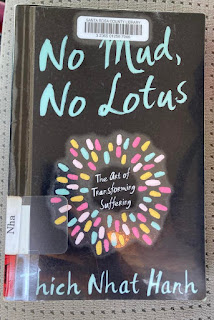"A cloud never dies."
"We are already what we want to become."
"Do not run anymore you look silly." Haha!
I've tried to recreate his calligraphy, but I don't have high hopes. My second-grade teacher predicted I'd never have nice handwriting, being left-handed and all, but that's not what counts here.
Back to No Mud, No Lotus. One of over 100 books by Thich Nhat Hanh, this book is an easy, comforting read. He makes mindfulness seem so simple. "The way we start producing the medicine of mindfulness is by stopping and taking a conscious breath, giving our complete attention to our in-breath and our out-breath. When we stop and take a breath in this way, we unite body and mind and come back home to ourselves."
He uses a light approach to suffering that acknowledges pain and eases it."Breathing in, I know suffering is there. Breathing out, I say hello to my suffering." And for a dose of hope, "If you want to experience what the end of suffering will feel like, it is in the here and the now with this breath. If you want nirvana, it's right here. Breathing in, I know I am breathing in. Breathing out, I smile."Thich Nhat Hanh shares a life-transforming Buddhist teaching that uses arrows as its metaphor. If you are hit by an arrow, you will feel pain. But if a second arrow hits in the same place, that pain will more than double the first. Consider the first arrow as something negative that happens to you -- failing a test, losing something valuable, getting sick, or being rejected. Then... "The second arrow, fired by our own selves, is our reaction, our story-line, and our anxiety. All these things magnify the suffering."
I catch myself time and again reliving something painful; in essence, firing a second arrow where the first one hit. Now I know to STOP, acknowledge the suffering, come back to the present moment and breathe. Oftentimes, we block our happiness by our desires. "We believe these things are necessary for our survival, our security, and our happiness. But many of these things - or more precisely our beliefs about their utter necessity - are really obstacles for our joy and happiness.""If you come to look deeply into your fearful attachment, you will realize that it is in fact the very obstacle to your joy and happiness. Letting go takes a lot of courage sometimes. But once you let go, happiness comes very quickly."
"Just as we may have many small sorrows that mindfulness can help us release, we also have a multitude of small moments of happiness that we can savor and extend." Create happiness by enjoying the moment. "This is the art of happiness, tasting and delighting in the little happinesses of daily life." The monk suggests taking a piece of a paper and writing down all the conditions for happiness available to us right now. "One page may not be enough," he adds.Thich Nhat Hanh passed away earlier this year at the age of 95, but he has left behind a large treasure of teachings, hope, and good humor. I've taken to wearing a bracelet that, every time I become aware of it on my wrist, I breathe and smile. It's just a simple way to become more mindful. If you'd like to go a step further and purchase Thich Nhat Hanh's calligraphy, "One Buddha is not enough" is on sale on Etsy for $24,500.




